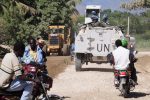Haiti Support Group Post-Earthquake Priorities
At 4.53pm on January 12th 2010, the earth shook violently in and around the overcrowded city of Port-au-Prince, Haiti’s capital. The death toll, destruction and destitution caused in in just seconds were well chronicled — for about ten days — by the international media.
There was no definitive death toll, but we do know that between 230,000 and 305,000 people died. Some 4,100 of those who survived had to have emergency amputations — often in horrendous conditions. At least 1.5 million people were made homeless.
Just as the media failed to analyse the social, economic and political conditions that played such a role in making the Haitian earthquake the most deadly natural disaster this century, the press are no longer there to tell you the the inspiring tale of how Haitians are responding. WE DID.
For over 30 years, we have been amplifying the voices of Haitian grassroots organisations through lobbying, campaigning and advocating. In doing so, the Haiti Support Group (HSG) plays a vital role in educating politicians, press and public in Europe and North America. Never has this role been so vital.
Despite what you may have read about the UN, the Red Cross, international NGOs or Bill Clinton (the UN Secretary General’s Special Envoy to Haiti), it is Haitians, not foreigners, who are playing the lead role in the reconstruction of Haiti.
As numerous donor bodies try (or often don’t) to co-ordinate a reconstruction and redevelopment program, it is Haitians working as rubble clearers, builders, flood prevention engineers, health promotors, sanitation workers and teachers who are forging their own vision of a new Haiti.
We believe that an evolving and expanding grassroots vision needs to replace the flawed development model that singularly failed the vast majority of Haitians in the three decades preceding the earthquake. That failed template — an urban, centralised, factory-assembly plant model — accounts for much of the massive death toll in the earthquake.
We have rededicated ourselves to amplifying the voices of ordinary Haitians demanding a real say in the development models now being forged by others for their country. We have launched campaigns (eg on forced evictions of the internally displaced (please see our Campaigns and Advocacy section) and are lobbying in Brussels for better use of EU aid, e.g. to build more food sovereignty.
All such efforts need YOU more than ever. We have some secured some external funding. But this is always temporary, whereas the need to speak up for equitable development policies, human rights, genuine participatory democracy and the ordinary Haitians who advocate them but are usually ignored, is a long-term effort.
In the meantime as Haitians say: Le ou bezwen, se ou k’ pou mache — When it’s you in need, it’s you who must take the first step. Haitians have indeed taken the first step post- earthquake but, as this website makes clear, they face massive obstacles. Accompany them, and us, on a journey that will be as challenging as the remotest Haitian mountain road. Please join the Haiti Support Group now.
'Natural' Disasters in Haiti and the 2010 Earthquake

Interview: Noam Chomsky on Latin America
Interview: Noam Chomsky on Latin America December 13, 2012, Keane Bhatt, NACLA original article here Manufacturing Contempt [Renowned linguist, political analyst

Hurricane Sandy exposes Haiti’s agriculture and environment woes
Nov 1, 2012 Anastasia Moloney, Alertnet original article here Years of neglect of agriculture and disaster prevention in Haiti, coupled with

Housing Exposition Exposes Waste, Cynicism
Housing Exposition Exposes Waste, Cynicism September 24, 2012 by Haiti Grassroots Watch/Ayiti Kale Je haitigrassrootswatch Zoranje, HAITI, September 24, 2012 –

Haiti and the Shock Doctrine
Haiti and the Shock Doctrine 14 August 2012, by Matt Kennard in opendemocracy.net (Pour une version française de cet article,

The Creole Connection: New Orleans, Haiti and Catastrophe
The Creole Connection: New Orleans, Haiti and Catastrophe Beverly Bell, 30 July 2012, Other worlds are possible As a native and

Haitians Forced Out of Tents to Homes Just as Precarious
The New York Times – by Randal C Archibold – April 23, 2011 PORT-AU-PRINCE, Haiti — The way Robert Darvin sees

Verdict: Cholera Outbreak Originated in UN Camp
Verdict: Cholera Outbreak Originated in UN Cam By Richard Knox, NPR Health Blog, 6 May 2011 Suspicions that U.N. peacekeepers

Cholera in Haiti Surges in Storm Areas
Cholera in Haiti Surges in Storm Areas. Associated Press – By Trenton Daniel – June 10, 2011 PORT-AU-PRINCE, Haiti The

Behind Closed Doors of Port-au-Prince “Reconstruction”
Behind Closed Doors of Port-au-Prince “Reconstruction” Port-au-Prince, June 10 2011 – Why hasn’t reconstruction begun in downtown Port-au-Prince, the area

